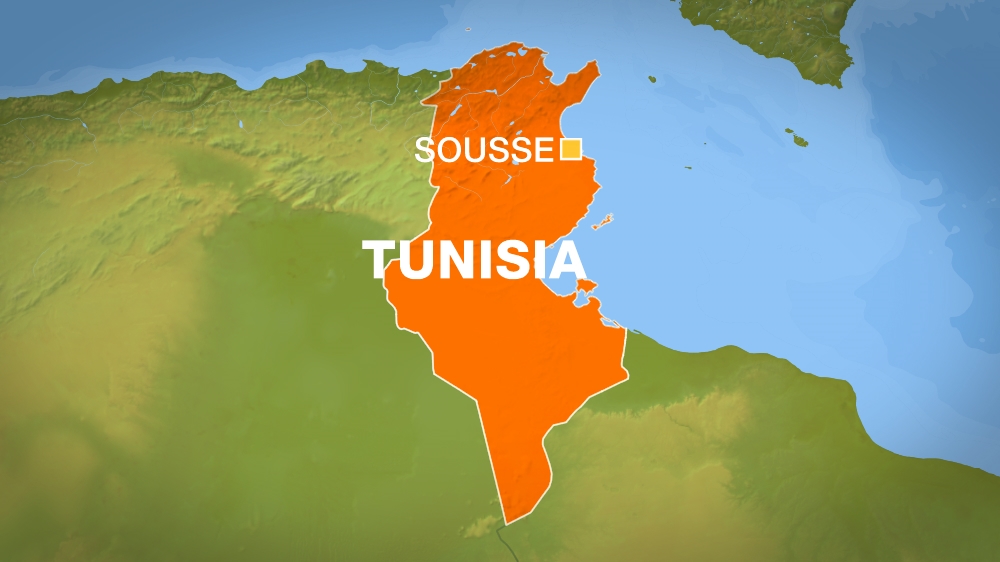Foreign tourists fly out after Tunisia killings
Departures follow attack on beach resort in Sousse, leading to 38 tourists’ deaths and prompting closure of 80 mosques.

Foreign tourists are flying out of Tunisia after the deaths of 38 tourists in an attack on a beach resort in the coastal town of Sousse.
Saturday’s exodus came despite the Tunisian government’s rejection of claims that the Islamic State of Iraq and the Levant (ISIL) group carried out Friday’s attack, saying the suspect had never travelled abroad and was not previously known to police.
The government of the North African country has also launched a crackdown on what it calls extremism.
|
|
| Tourists flee Tunisia after resort attack |
An armed man disguised as a tourist opened fire on a beach outside two hotels with a weapon he had hidden in an umbrella on Friday.
The attacker was shot by police, taking the death toll including the assailant to 39, with dozens of others injured.
Witnesses said the assailant took his time, targeting people at point-blank range, first on the beach and then around the swimming pool, reloading his weapon several times and tossing an explosive.
UK’s foreign minister said at least 15 Britons were killed in the beach attack and that the toll “may well rise.”
Tobias Ellwood said the attack was “the most significant terrorist attack on the British people,” since the July 2005 bombings of the London transport network that killed 52 people.
Tunisian, German, Belgian and Irish citizens were also killed.
Essid announced plans to close down 80 mosques that remain outside state control for inciting violence.
In Depth: Tunisia attack leaves tourism sector reeling
“It is not acceptable to have in Tunisia any mosques operating outside the rule of law,” he said.
Tunisia’s government had already stepped up security before the hotel attack.
“Now it’s talking about more police and military on the ground. But there are thousands of tourist spots and hotels. Many of them are an easy target for someone intent on killing,” Al Jazeera’s Nazanine Moshiri, reporting from Tunis, said.
|
|
Rafik Chelli, a senior interior ministry official, said the shooter was a student unknown to authorities and not on any watchlist.
Local radio said police captured a second assailant, but officials did not immediately confirm the arrest or his role in the attack.
In a statement on social media, ISIL claimed responsibility for the attack “on infidels”. Twitter accounts supporting ISIL released photos that claimed to show the shooter.
However, the government dismissed ISIL’s claim.
Friday’s attack was the worst in Tunisia’s modern history and the second major massacre this year following the assault on the Bardo national museum in Tunis when armed men killed 22 mostly foreign visitors.
Tunisia has been hailed as a model of democratic transition since its 2011 Arab Spring uprising and has escaped the worst of the region’s violence.
RELATED: Ban Ki-moon – stop ISIL ‘in the name of humanity’
“It’s held free and fair elections. It’s political process has been inclusive,” Al Jazeera’s Moshiri said.
“Religious and secular parties are in government together. But there are a minority of Tunisians who want a so-called Islamic State here. Thousands of young Tunisians are fighting for armed groups abroad.”
Witness account
Speaking of the resort attack, Elizabeth O’Brien, an Irishwoman who was staying at a neighbouring hotel with her two sons, said there was panic on the beach when gunfire erupted.
“I honestly thought it was fireworks and then when I saw people running … I thought, my God, it is shooting,” she told Irish radio station RTE.
“The waiters and the security on the beach started to say ‘Run, run, run!'”
![Friday's attack in the coastal town of Sousse has been described as the deadliest in Tunisia's modern history [AP]](/wp-content/uploads/2015/06/20960f98d34348648097cdd634720883_18.jpeg)
In Sousse, many tourists were already packing their suitcases into buses and checking out of hotels to leave after the attack, the Reuters news agency reported.
German and British tour operators were organising flights for tourists wishing to return from Tunisia and said those who booked Tunisian holidays for this summer could rebook or cancel the trips free of charge.
Heartland of tourism
Sousse, alongside nearby Hammamet and the island of Djerba, is the heartland of Tunisia’s most popular beach resorts, drawing visitors from Europe and neighbouring North African countries like Algeria.
The town has also become a supplier of self-declared jihadists , as Al Jazeera has reported.
Six million tourists, mostly Europeans, visited Tunisia’s beaches, desert treks and medina souks last year, providing seven percent of its gross domestic product, most of its foreign currency revenues and more jobs than anything but farming.
“This is a catastrophe for the economy,” Salma Loumi, Tunisia’s tourism minister, said.
“Our losses will be great, but the loss of human life was even greater.”
